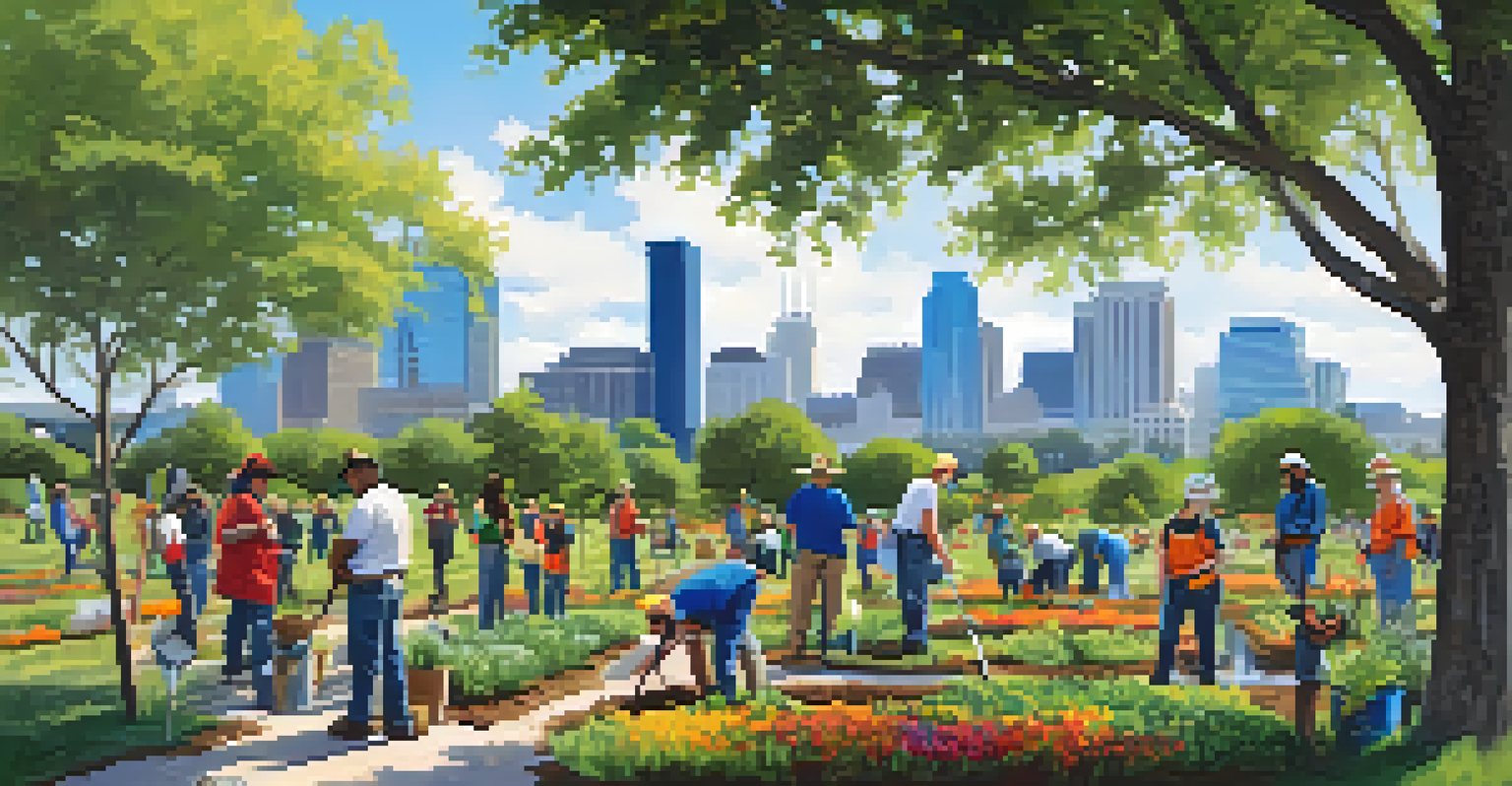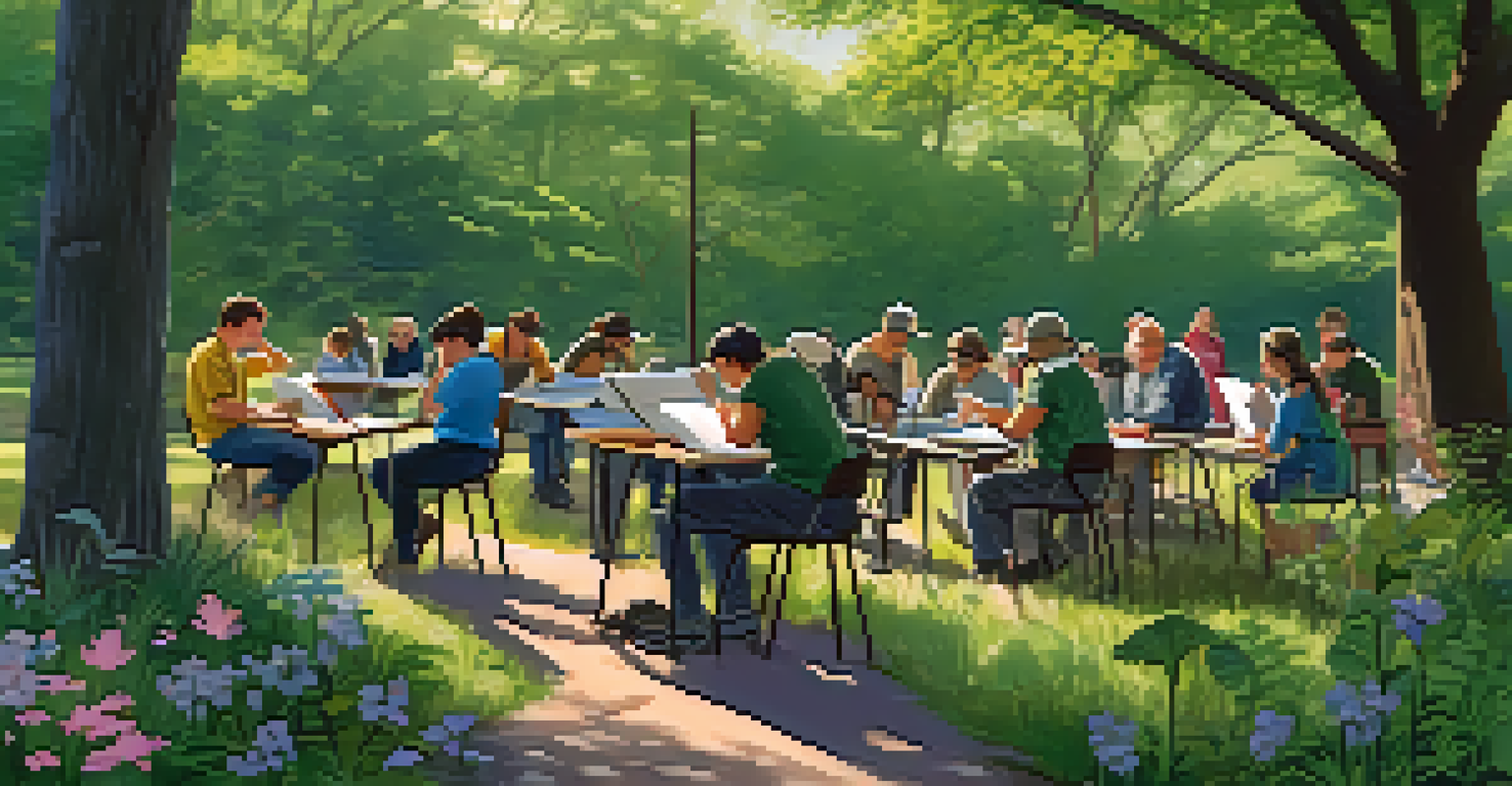Volunteering Opportunities in Austin's Conservation Projects

The Importance of Conservation in Austin
Austin is known for its lush landscapes and vibrant ecosystems, making conservation efforts essential. Protecting these natural resources not only preserves the beauty of the city but also supports local wildlife. Additionally, conservation plays a crucial role in combating climate change, ensuring a sustainable future for generations.
The greatest threat to our planet is the belief that someone else will save it.
Community involvement in conservation fosters a sense of stewardship among residents. When people actively participate in preserving their environment, they develop a deeper connection to nature and their community. This engagement not only benefits the ecosystems but also enhances the quality of life in Austin.
Moreover, conservation initiatives often lead to educational opportunities for volunteers. By participating in these projects, individuals can learn about local flora and fauna, as well as sustainable practices. This knowledge empowers residents to make informed decisions in their daily lives, further contributing to a healthier environment.
Types of Conservation Projects Available
Austin boasts a variety of conservation projects that cater to diverse interests and skills. From habitat restoration and tree planting to wildlife monitoring and water quality testing, there’s something for everyone. Each project not only contributes to environmental health but also offers a chance to learn and grow.

For those interested in hands-on work, habitat restoration projects are particularly rewarding. Volunteers often get involved in removing invasive species and planting native plants, which helps to restore balance to local ecosystems. This type of work provides immediate visual results, making it all the more satisfying.
Conservation Enhances Community Bonds
Active participation in conservation fosters a strong connection between residents and their environment, enhancing the overall quality of life in Austin.
If you prefer a more observational role, wildlife monitoring might be the perfect fit. Volunteers can assist in tracking bird populations or surveying local wildlife, which provides vital data for conservation efforts. This work is crucial for understanding the health of Austin’s ecosystems and helps inform future conservation strategies.
How to Find Volunteering Opportunities
Finding volunteering opportunities in Austin is easier than ever, thanks to various online platforms. Websites like VolunteerMatch and local conservation organizations often list available projects, making it simple to get involved. You can filter opportunities based on your interests and availability, ensuring a good fit.
We won't have a society if we destroy the environment.
Another great resource is social media, where many conservation groups share upcoming events and volunteer needs. Following these organizations can keep you updated on new projects and provide insights into their missions. Additionally, engaging with these communities can lead to networking opportunities and new friendships.
Local community centers and libraries may also have bulletin boards or newsletters highlighting volunteer opportunities. It’s worth checking in regularly or subscribing to stay informed. Becoming part of these networks can enhance your volunteering experience and connect you with like-minded individuals.
Benefits of Volunteering in Conservation
Volunteering in conservation offers numerous benefits, both for the environment and the individual. By contributing your time and energy, you actively support the preservation of Austin’s natural beauty. This not only helps local wildlife but also enhances community resilience against environmental challenges.
On a personal level, volunteering can be a fulfilling way to connect with nature and meet new people. Many volunteers report a sense of accomplishment and joy from seeing the positive impact of their work. This social aspect can lead to lasting friendships and a stronger sense of community.
Diverse Volunteering Opportunities
Austin offers a variety of conservation projects, from habitat restoration to wildlife monitoring, catering to different interests and skills.
Furthermore, volunteering can provide valuable skills and experiences. Whether you’re learning about ecology, project management, or teamwork, these skills can be beneficial in both personal and professional contexts. This holistic approach to volunteering makes it an enriching experience for everyone involved.
Success Stories from Local Volunteers
Hearing about successful conservation projects can inspire others to get involved. For instance, the restoration of the Barton Creek Greenbelt has seen countless volunteers come together to revitalize this beloved natural area. Their collective efforts have resulted in improved habitats and increased biodiversity, showcasing the power of community action.
Another remarkable example is the City of Austin's Urban Forest program, where volunteers have helped plant thousands of trees throughout the city. These trees not only provide shade and beauty but also improve air quality and support wildlife. The success of this initiative demonstrates how dedicated volunteers can make a tangible difference.
These success stories serve as a reminder that every small effort counts. When individuals unite for a common cause, their impact can be significant. Sharing these experiences encourages others to join in, creating a ripple effect of positive change in the community.
Tips for First-Time Volunteers
If you’re considering volunteering for the first time, it’s natural to feel a bit apprehensive. Start by researching different projects to find one that resonates with you. Whether it's planting trees or participating in clean-up events, choosing something that aligns with your interests will make the experience more enjoyable.
Don’t hesitate to reach out to project coordinators with any questions or concerns. They can provide valuable insights and help you understand what to expect. Being open about your skill level and availability can lead to a more tailored and fulfilling volunteering experience.
Volunteering Benefits All Involved
Engaging in conservation not only supports the environment but also provides personal fulfillment, skills development, and a sense of community.
Lastly, remember to have fun and be flexible. Conservation work can sometimes be unpredictable, but that’s all part of the adventure. Embrace the opportunity to learn and connect with nature, and you’ll likely find that volunteering is as rewarding as it is impactful.
The Future of Conservation in Austin
As Austin continues to grow, the importance of conservation will only increase. Urban development poses challenges to local ecosystems, making volunteer efforts even more crucial. By engaging in conservation projects, residents can help ensure that Austin's natural beauty is preserved for future generations.
The city is committed to sustainability and environmental stewardship, which will create more opportunities for volunteers. Emerging technologies and innovative practices in conservation could reshape how we engage with our environment. Staying informed and involved can help you be part of this exciting evolution.

Additionally, fostering a culture of conservation among residents can lead to lasting change. By encouraging others to participate in volunteer projects, you help create a ripple effect of awareness and action. Together, we can ensure that Austin remains a thriving hub of biodiversity and natural beauty.